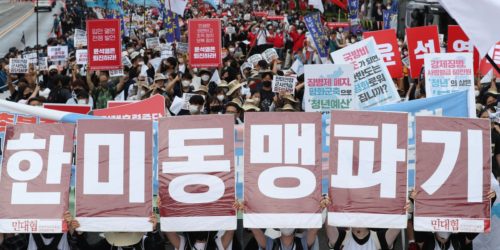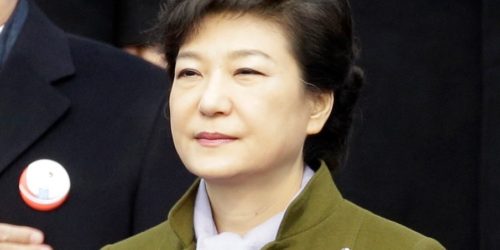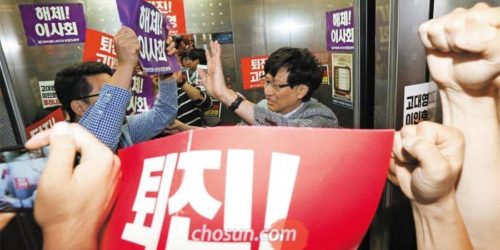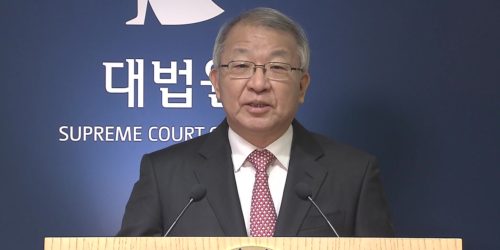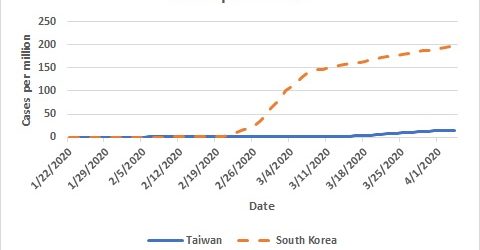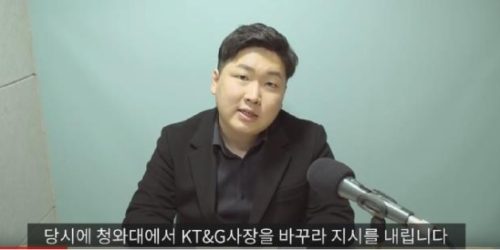Samsung in Crisis, Moon Government’s Takeover Attempts and China Threat; Impact on Global 5G, COVID-19 Treatments, World Economy, and South Korea’s Liberal Democracy
2020-6-11, Tara O
Key points:
- Samsung is in crisis due to several years of South Korean government’s aggressive and unreasonable investigations against the company and the Vice Chairman Lee Jae-Yong, which appear to be frivolous, without merit, and unjust.
- Lee was convicted of a crime without evidence in order to justify the impeachment of president Park Geun-hye (although the impeachment cannot be based on this or any other crimes other than treason or insurrection, per the constitution) and to imprison her in the criminal trial that followed.
- As a result of the conviction and sustained investigative pressure, the South Korean government has interfered in Samsung’s operations and is now forcing it to integrate labor unions; it has been union-free.
- The Moon administration has also used the National Pension Service as an activist investor to control who is moved into management positions.
- The Moon administration appears to be interested in taking over control of Samsung based on its statements and actions.
- Globally, the actions of the Moon administration threaten the future of 5G technology development as well as the global supply chain for critical life saving biopharmaceuticals and COVID-19 treatments.
- China may acquire Samsung trade secrets and technology through acquisition or theft as a result of the interference by the Moon administration.
Over the past 4 years, Samsung has been investigated non-stop on spurious charges. Just in the past 1 ½ years, Samsung has had 50 search warrants executed against it and the government has summoned 110 people for questioning in what can only be described as an arduous time for Samsung.
The latest investigation focuses on a merger between Samsung C&T and Cheil industries, but Samsung has had government investigators searching and seizing equipment and records for even longer, going back to the time of the impeachment of President Park Geun-hye. Samsung’s Vice Chairman Lee Jae-yong (이재용) spent a year in jail after Special Prosecutor Park Yeong-su (박영수) arrested Lee with a warrant in 2017 (The judge rejected the first arrest warrant request in January 2017, but approved the second request in February 2017).
Samsung has abided by the lawful procedures in these investigations, yet on June 4, 2020, prosecutor Lee Bok-hyeon (이복현) suddenly requested arrest warrants with the court to arrest and jail Lee Jae-yong, Samsung Vice Chairman along with Choi Gee-seong (최지성), the former head of Samsung Future Strategy Group and Kim Jong-jung (김종중), former head of Samsung Strategy team. What is really occurring? “Corruption and bribery” often repeated in the press does not explain what is really going on. In fact, it has more to do with threats to South Korea’s liberal democracy and market economy, the nature of the Moon administration, and China.
The two issues the prosecution is pursuing regarding Samsung are 1) the charge of “management succession request” and 2) the charge that the merger between Samsung C&T (삼성물산) and Cheil Industries (제일모직) were illegal. Despite years of continuous and multiple investigations, there still appears to be no evidence. The prosecutor, however, is fixated on jailing the Vice Chairman Lee Jae-yong and the CEOs of Samsung companies.
“Silent” request for help in management succession?
The prosecutors charged that Samsung’s Lee asked President Park Geun-hye for help in his succession at Samsung, by providing access to horses to national equestrians competing at international sports events, which include Chung Yoo-ra (정유라), a Gold Medal winner at the 2014 Asian Games.
First, there was no such request, yet the prosecutors insisted, and the judge ruled that although there was no explicit request, that there was a “silent” request (묵시적 청탁), which by definition means there was no evidence of such request. The judge just made up a justification in order to find Lee Jae-yong guilty, which is the same justification that found president Park guilty of “corruption and bribery” in the criminal charges following her impeachment.
Second, the judge used the absurd concept of “guilt by association” not found in liberal democracies, when he decided that the access to horses was a “bribe” to Park Geun-hye, because the horses were for the Asian Olympics Gold Medalist Chung Yoo-ra (among other equestrians), and she is the daughter of Choi Seo-won, who is a friend of Park Geun-hye.
Third, it is routine for companies in many countries, including South Korea, to sponsor national athletes, especially because the companies also derive benefits–advertising of their brands to international audiences, especially when the athletes win gold medals. If Samsung providing horses to national-level equestrians is a “bribe and corruption,” then what does that mean for a long list of companies–LG Electronics, SK Telecom, KB Financial, POSCO, CJ CheilJedang, and more–that provided financial support to train the athletes of the PyeongChang Winter Olympics in 2018 or any other international sports competitions? What does that say about the Moon Jae-in administration, under which these companies provided support for the 2018 Winter Olympics? Is the Moon administration also guilty of “corruption and bribery?”
Yet the Moon administration, through the judiciary and the media, over which it exerts great control, especially by taking over MBC and KBS, continues to portray Samsung as guilty of “corruption and bribery” for providing access to horses to equestrians. One key reason is that if Lee is not found guilty in this case, then they must find Park Geun-hye not guilty for the same crimes charged against her, and that does not serve the interest and the goals of the Moon administration. In fact, it could well bring down the Moon administration due to legitimacy concerns. For more on the false impeachment of Park, see here and here.
Judges making up justifications in order to find someone guilty, rather than ruling based on facts and evidence, is a hallmark of communist regimes and is reminiscent of a quote attributed to Lavrentiy Beris, Joseph Stalin’s secret police chief: “Show me the man and I’ll find you the crime.” Such an act shows that the rule of law–an important pillar of liberal democracy–in South Korea is crumbling. If the judge is pressured by the Moon Jae-in administration to disregard due process, which appears to be the case, then another important component of liberal democracy–the separation of power accompanied by checks and balances–is also faltering.
Merger between Samsung C&T (삼성물산) and Cheil Industries (제일모직)
On March 14, 2019, the prosecutor executed search warrants against the people involved in the merger of Samsung C&T and Cheil Industries; the merger occurred in July 2015. The accusation is that the prices of Cheil Industries’ stocks were inflated in the merger. The prosecutor maintains that there was stock price manipulation in the merger between Samsung C&T and Cheil Industries, making it illegal, but was this in fact the case?
At the time leading up to the merger, Lee Jae-yong owned 23.23% of Cheil Industries stocks, while owning no stocks in Samsung C&T. (0:33) Cheil Industries owns 46.79% of Samsung BioLogics, which in turn owns Samsung Bioepis, which is a biopharmaceutical company, a joint venture with Biogen. (0:40) The prosecutors charge that the stock prices of Samsung Bioepis were inflated by accounting fraud, which then inflated the value of Samsung Biologics, which then inflated the value of Cheil Industries vis-a-vis Samsung C&T, thereby benefiting Lee by allowing him to purchase more of Samsung C&T and hurting the stockowners of Samsung C&T because Cheil was presumably over-valued.
The prosecution’s claim, however, does not pass the logic test. The resolution to merge Cheil Industries and Samsung C&T was announced on May 26, 2015 by the board of directors. They announced that the Cheil Industries’ merger with Samsung C&T would be at the ratio of 1:0.35 calculated according to the stock price. The stock price is the average of the stock prices over a one month duration prior to the merger announcement, which is April 26 to May 25, 2015. (1:15) The general stock holders meeting was held on July 17, 2015, when 69.53% of the attendees voted for the merger. The merger occurred on September 1, 2015 and the new name of the merged company is Samsung C&T.
The value of Bioepis was decided much later during November-December 2015, which is long after the determination of the merger price and ratio in May 2015. (1:34) Thus, the valuation of Samsung Bioepis, which occurred much later, could not impact the stock price of Cheil industries or the ratio determination of Cheil Industries and Samsung C&T, which occurred 5-6 months earlier.
The prosecutors also made an issue of Biogen’s increase in the Samsung Bioepis’ shares, but the increase was a function of Biogen exercising the option to purchase more shares.
In a 17-hour interrogation during May 26-27, 2020 by the prosecutor, Lee testified that there were absolutely no instructions from him or reports received about the alleged fraud in the merger issue.
Sentencing Disparity
In addition to what appear to be punitive investigations into Samsung itself, there is also substantial disparity in sentencing for the alleged crimes of Samsung Vice Chairman Lee Jae-Yong when compared against a gruesome murder committed by a ruling party member.
At the initial trial against Lee during the Park Geun-hye trial following the impeachment, Judge Kim Jin-dong (김진동) sentenced Lee to 5 years in jail, after acknowledging the “management succession” issue, but rejecting 11 other individual pending issues. Judge Kim cited an invented justification–“silent” request–in acknowledging the access to the horses by a gold-medalist equestrian Chung Yu-ra as “bribe.” (Note: Other equestrians also accessed the horses.)
In Park Geun-hye’s petition, she stated she never received any unlawful request for favor from Lee Jae-yong nor provided any favor to him. Park also stated that she was not even aware that Samsung provided support to Chung Yu-ra, Choi Seo-won’s daughter.
Judge Kim resigned sometime after the ruling, perhaps because of guilty conscience for sending an innocent person to jail due to political pressure. At the Appeals Court in Seoul, Judge Chung Hyeong-sik (정형식) still acknowledged the “silent” request argument, but reduced Lee’s sentence to 2.5 years, with 4 years of probation instead. Thus on February 8, 2018, Lee Jae-yong was freed from jail. This was again appealed by the prosecution, and at the Supreme Court in Seoul presided by Judge Jung Joon-yeong (정준영), the prosecutor asked for 10 years 8 months to 16 years 6 months of imprisonment.
By comparison, those affiliated with the ruling party or the Moon Jae-in Blue House seem to get relatively light sentencing and their investigations get interrupted, if they get investigated at all. On June 3, 2020, the sentencing for former Kimpo City Council Chairman Yoo Seung-hyeon (유승현), who killed his wife by beating her to death with a golf club, received a 7-year prison sentence at appeals, which was reduced from an initial 15 years. Yoo being drunk was cited as a mitigating factor in the judge’s decision. Jung Joon-yeong was also the presiding judge. Yoo Seung-hyeon is a member of Moon’s party, the Democratic Party of Korea, and many believe his light sentencing relative to his gruesome crime is due to his political affiliation with the ruling party.
The scandal of massive corruption, bribery, forgery, Chinese involvement, embezzlement, tampering with evidence, falsifying documents for their children’s college admissions, and a long list of other allegations of Cho Kuk, a close aide of Moon Jae-in, and his family that set off huge protests in October 2019, initially seemed to have gone somewhere with investigations. After Moon appointed Choo Mi-ae, Democratic Party of Korea, as the Justice Minister, she quickly replaced the senior prosecutors working on the case, and soon the investigations fizzled.
Samsung’s Statement of June 7, 2020
On June 4, 2020, the prosecutor requested an arrest warrant for Samsung’s Lee Jae-yong. On June 7, 2020, Samsung issued this statement, pleading for help. Samsung’s statement is below:
Samsung is in crisis. To overcome this crisis, foremost, the management must be normalized. For this, we make the following request.
The prosecution investigated Samsung Biologics’ accounting for a long period of time. In addition, despite Samsung abiding by the lawful procedures of the ongoing prosecution investigations and deliberations, arrest warrants were issued for all current officers, including Vice Chairman Lee Jae-yong.
Judicial proceedings will now proceed, including the court’s decision on the warrant. The prosecution said it would also proceed with the deliberation process on whether to continue the investigation and to indict. Whatever the outcome, Samsung will respect the judicial decisions of the courts and the investigative hearing committee.
However, for the objective and rational judgment of the court and the investigative review committee, Samsung actively seeks to explain several issues.
This is because some media have been continuously reporting speculative reports that are not based on confirmed facts or are based on suspicious sources, including articles that assume a strong impression of guilt.
Due to these articles, the damage that Samsung and its employees have to deal with is considerable. Please refrain from excessive reporting that is not based on facts.
The merger between Samsung C&T and Cheil Industries was carried out legally in accordance with relevant laws and procedures. The accounting treatment of Samsung Biologics was also processed in accordance with international accounting standards. Reports of stock price manipulation for the merger were also not based on facts.
Not only are these articles likely to distort objective judicial decisions, they are not desirable for Samsung as well as for the future of our [South Korea’s] economy.
With the prolonged COVID -19 situation, our economy is unpredictable. Samsung, which should be a leading player in overcoming this situation, is facing a crisis in management, which is causing anxiety among the people. We feel shame and sorrow.
The current crisis is something Samsung has never experienced before. Due to the prosecution’s prolonged investigation, the management is atrophying. Meanwhile, external uncertainties are deepening due to the COVID -19 and trade disputes between the United States and China.
Samsung’s employees will do their best to overcome this crisis. In addition, we will make great efforts to overcome the crisis of the Korean economy.
Please help Samsung fulfill that role. Please help open the path for Samsung to be able to normalize its management, so it can strive towards a new takeoff of South Korea’s economy
The Atrophying of Samsung Management Through Pressure
For such a major global company to begin a statement with “Samsung is in crisis” is extremely unusual. To those familiar with corporate communications, this should highlight how serious this issue is. Years of multiple investigations as well as the jailing of Lee Jae-yong, despite no evidence, for a case related to providing access to horses to athletes for an international competition, which the prosecution and the judges linked to Park Geun-hye, has destroyed their spirit and atrophied the management at Samsung.
The media’s irresponsible reporting that is not based on facts, as expressed in the statement above, exacerbates the problem. The management’s time, instead of focusing on the business operations and innovation, was consumed by relentless investigations. The harassment and the prospect of jail and other punishments in a court that hardly appears independent have led them to behave as people with beaten-down spirits.
In the appeals court, Lee Jae-yong was released from jail after a year on February 8, 2018, after receiving a 2 ½ year jail sentence, but 4 years of probation instead. As mentioned earlier, the courts are in a situation in which they must find Lee guilty, in order to justify their guilty ruling (and a whopping 25-year jail sentence for this particular issue) for Park Geun-hye, although in both cases, the reason for the “guilty” verdict was a fictitious “silent” request–a guilty verdict that could not occur in an independent court that adheres to rule of law. The severe punishment of an unjust court, along with the biased press that played a huge role in portraying Samsung as guilty, without evidence, must have weighed heavily on the mind of Lee.
Commission to surveil and pressure Samsung
An example is Lee Jae-yong apologizing to the public on May 6, 2020, in which he succumbed to the demands of the Samsung Law Surveillance Commission (삼성준법감시위원회), which itself appears to be a form of coercion by the court.
In his apology, Lee stated that he “will try so that there are no longer accusations that Samsung has no labor union in the management…will strictly observe the labor-management relations laws and guarantee the three rights of labor.”
Lee also said, “I and Samsung have been reprimanded for the succession issue, and have been tried for bribery related to succession. Many of the controversies surrounding me and Samsung originated from this issue. I will try to not have additional controversy regarding the management succession.”
On January 9, 2019, about a month prior to Lee’s release from jail, Samsung announced a new watchdog organization called the “Samsung Law Surveillance Commission (삼성준법감시위원회),” comprising primarily of members from outside of Samsung. The Commission comprises of seven members, including six from outside of Samsung: Kim Ji-hyung (김지형), the chairman, who is a former Supreme Court justice and labor law specialist, Go Kye-hyun (고계현), the general secretary of the Consumer Sovereign Citizens’ Conference (소비자주권시민회의), Kwon Tae-seon (권태선), co-president of the Solidarity Conference of the Civil Society Organizations (시민사회단체 연대회의), Kim Woo-jin (김우진), professor of management at Seoul National University, lawyer Bong-wook (봉욱), and Shim In-sook (심인숙), professor of the Graduate School of Law, Chung-Ang University. Within Samsung, Lee In-yong (이인용), advisor for Social Contribution Affairs.
This surveillance commission demanded that “Vice Chairman Lee apologize for violations of compliance obligations in the process of succession of the management of the Samsung Group’s management. The legal community held a press conference on April 28, 2020, expressing the abuse of authority by the Samsung Law Surveillance Commission, in that the commission assumes guilt and is pressuring Lee to “admit” guilt even before the court makes a ruling on the case.
The use of special committees that act as additional decision bodies above the existing control structures in organizations has been used extensively since Moon Jae-in took office. For instance, a special committee that reviewed the National Intelligence Service (NIS) took away NIS’s core capability of monitoring/catching North Korean spies/agents, calling it a “reform.” In Samsung’s case, this commission to surveil is forcing policies to bring unions into Samsung and for the senior management to conduct “self-criticism sessions”–a practice common in North Korea and during Mao’s Cultural Revolution in China.
Labor Union in Management
The Commission also compelled Samsung to “talk and be friendly with trade unions and civic groups by sharing decisions on global management activities” as well as to abandon the principle of no unions. The Moon Jae-in administration has advocated a pro-union stance, even trying to add a “guarantee of labor union participation in management” in the Constitution in 2018.
There are concerns that the creation of a labor union, which would likely be under the militant Korean Confederation of Labor Unions (KCTU), at Samsung would inhibit its creativity and professional management, and would actually contribute to its destruction, as in the case of the GM Korea factory in Gunsan City in 2018. Although GM Korea faced losses years in a row, the Metal Workers’ Union under the KCTU continued to demand hiked wages, held lengthy general strikes, and conducted violence against the management, until the factory closed in Gunsan, and they lost their jobs. They even held strikes to demand that the factory does not close.
Samsung Electronics is the largest company in South Korea and the world’s 16th largest, according to Forbes’ “2020 Global 2000.” The second largest company in South Korea, Hyundai Motors, is the world’s 189th, which gives an appreciation of how large Samsung is and how significant it is to South Korea’s economy. In fact, Samsung accounts for around 15% of South Korea’s GDP. The thought of the KCTU making management decisions horrifies many South Koreans, who are aware of the KCTU’s ideological leanings toward socialism, incessant strikes and political protests, and its violent practices.
Takeover of Samsung, private enterprises leading to disintegration of Capitalism and Liberal Democracy
In addition to the labor union, the Moon administration has played an active role in management by invoking a “stewardship code” that the National Pension Service (NPS) adopted in July 2018 in ousting the CEO of Korean Air Cho Yang-ho (조양호) on March 27, 2019. Instead of the NPS selling the stocks it deems not performing, it used “stewardship” to actively vote in senior personnel management. The Moon administration also subjected Korean Air to lengthy and extensive investigations, where it consumed the majority of the senior management’s time and energy. As with Samsung, Korean Air also suffered from the negative image propagated by the media and harassment-level investigations.
On April 8, 2019, less than two weeks after his ouster, Cho Yang-ho passed away from “chronic ailment,” which many see as from the stress of the lengthy investigations, the shock of being ousted, and the injustice of the system. In both the cases of Samsung and Korean Air, the Moon administration played a much more invasive role in the companies’ management decisions preceded by lengthy investigations and negative images of Koran Air in the media. The Moon administration tried to gain greater control using the NPS to exercise “stewardship code” and buy up more stocks using NPS and other public entities.
When Samsung built a new smartphone plant in India, the person who cut the ribbon for the inauguration was not Samsung’s Lee Jae-yong, but Moon Jae-in. There are also suspicions that Lee was forced to go to Pyongyang in 2018. When Moon Jae-in went to North Korea in 2018, the Blue House wanted to take a large entourage, including business leaders, and Lee Jae-yong was one of the 200. Additionally, Lee and other business leaders faced humiliation when Ri Son-gwon (리선권) said, “Does the noodle go down your throat?” as people were eating a cold noodle dish called “naengmyeon” at an official luncheon. Ri is the Chairman of the Committee for the Peaceful Reunification of the Fatherland (조국평화통일원회). Apparently, Ri was discontent since there was no offer of investment from South Korea’s major business leaders.
The netizens turned the “noodle” comment into satire memes to display their displeasure and disbelief at how North Korea treated South Korea’s business leaders. Many surmised that Lee was forced to go to Pyongyang by the Moon administration, as there was no specific business reason for Lee to go to North Korea, in addition to the fact that he is a busy executive, who also has to deal with sustained investigations by the Moon administration.
Moon Jae-in’s close aide Kim Kyung-soo (current governor of South Gyeongsang Province out on bail) was found guilty of instructing a power blogger “Druking” to conduct a massive digital public opinion manipulation campaign that surged the popularity of Moon Jae-in, leading to his win in the 2017 presidential election. As a payoff for “Druking” (Kim Dong-won) handling the presidential elections and local elections, Kim Kyung-soo promised to give “Druking” the management rights of major companies in South Korea after confiscating them. (59:46) Daerim and Naver were the two companies mentioned, but it was not limited to them. (1:00:01) What this makes clear is that Moon and his people have plans to take over private companies in the name of the “public”–in effect expropriation, and to place their people in management positions.
The concept of demolishing private property is also publicly stated by the ruling party. Lee In Yong (이인영), former floor leader of the ruling party announced in February 5, 2020, that the the concept of nationalizing land must be on the table for inclusion in the constitutional amendment after the April 2020 general election. Moon’s current Justice Minister Choo Mi-ae has talked about nationalizing land, when she said, “land ownership by the state, Chinese-style, could be desired…the state owning the land and the proletariat using the land” in October 2017. Moon has sued Koh Young-ju, a former public security prosecutor, for calling Moon a communist; the words and actions of Moon and his party have embraced the idea of state ownership and control, which is central to socialism and communism.
There is no evidence that KCTU or the Moon Jae-in government officials or those who provide political favors would be better at running a company than the current CEOs and owners. In fact, it is more likely they will make it worse. More importantly, expropriating private property and entities is contrary to the very identity of South Korea based on capitalism and liberal democracy. The arrangement pursued by the Moon administration of greater state and labor union control or outright confiscation of private enterprises has the effect of changing the very foundation of South Korea’s system of market economy and liberal democracy to socialism or oligarchy.
China covets high technology
Samsung 5G
Another concern is that Samsung and its highly desired technology would be sold to China, specifically to the Chinese Communist Party (CCP). Due to national security concerns regarding Huawei, the U.S. is reaching out to Samsung, Nokia, and Ericsson to discuss the 5G network and equipment situation. As the holder of 4,361 5G-related patents with the patent authorities around the world, Samsung Electronics is #1 in patents granted for 5G, and as such, Samsung is a competitor to Huawei in the 5G network business.
The UK government is also meeting with Samsung the week of June 6, 2020 to discuss alternatives for 5G in order to reduce its reliance on Huawei.
On May 19, 2020, the U.S. Commerce Department banned semiconductor chip manufacturers from using U.S. machines and software to make chips for Huawei. Huawei invested in its subsidiary HiSilicon, which relies on Samsung, SK Hynix, and Taiwan Semiconductor for manufacturing of the chips, and these companies, in turn, rely on machines from the U.S. companies, such as Lam Research and Applied Materials. Thus the U.S. ban would prevent Huawei from accessing chips from the chip manufacturers in Asia.
For China, access to Samsung’s chip manufacturing and its 5G patents would be highly desirable. Despite the U.S. ban, the Moon government can try to force Samsung to flaunt the sanctions, as the Moon administration has continuously tried to do with the sanctions against North Korea. Many in South Korea are concerned that the pro-Beijing Moon administration would try to accommodate China and sell or transfer technology to China, once it gains control of Samsung and other private companies. The Democratic Party of Korea (Deobureon Minjoo Party) already set a precedence by giving away Samsung’s OLED trade secrets to China.
Samsung OLED
In March 2017, Samsung’s OLED production process, the fabrication plan layout, equipment, and other trade secrets that Samsung was required to submit to the court was later released to the public by National Assembly Kang Byeong-won (강병원), Democratic Party of Korea, despite Samsung’s objections and the judge’s ruling against the release. Six months later, BOE (京东方), China’s largest display company, announced that it would begin producing these OLEDs.
Essentially, a South Korean lawmaker in Moon Jae-in’s party, gave away Samsung’s OLED technology to China, by releasing the strictly controlled trade secrets of a private company, harming the company and South Korea’s economy. This kind of willful provision of cutting-edge technology to China is likely to continue, especially given the Moon government’s shifting of South Korea’s orientation toward China. After all, Moon Jae-in described China as the “highest peak” surrounded by lower peaks (other countries, including South Korea), praised Mao, and said “South Korea, despite being small…will share in the Chinese Dream” in his speech at Beijing University when he visited China in December 2017.
Samsung BioLogics and Samsung Bioepis
While Samsung is known for its electronics, there is another important portion of Samsung that has global implications. Samsung BioLogics, since its creation in 2011, has become the largest bio-pharmaceutical manufacturer in the world. Its plants are some of the newest and most advanced in the world. As a contract manufacturer of biological pharmaceuticals, it has over 30 clients globally. In April 2020, an American firm, Vir Biotechnology, ordered from Samsung BioLogics ₩442 billion ($358 million) of antibodies to treat COVID-19. Some of Samsung BioLogic’s other clients include GlaxoSmithKline PLC (GSK), manufacturing drugs for autoimmune disease lupus and Swiss pharmaceutical company Roche to make a portfolio of pharmaceuticals, including one for chronic lymphocytic leukaemia. Massachusetts-based company Biogen and Samsung BioLogics also launched a joint venture firm Samsung Bioepis in 2012, with 5.4% stake for Biogen. In June 2018, Biogen exercised its option to increase its stake to 49.9% for $700 million. Analysts expect this Biosimilars market to grow in value to $44.56 billion by 2026.
How China may try to access/acquire Samsung’s Technology
It is no secret that China covets technology and uses a variety of methods to obtain it, including theft. The advanced technology of South Korean companies, especially Samsung, is highly desirable to China, especially as it faces tough stance from the U.S. in response to China’s increasing aggressiveness.
One way for China to obtain Samsung’s technology is through purchasing controlling stakes in Samsung companies and using these controlling stakes to steal IP, especially if stock prices drop due to poor management and operations. This is a possibility if the Moon administration succeeds in placing labor union chiefs and government to control the management, as they will likely not prioritize innovation or increasing the value of Samsung. If the companies are run so poorly that they go bankrupt, then there could be technology transfer to China through the brain drain of talented Samsung employees. Moreover, Samsung may be forced to sell off pieces of the company to Chinese investors in order to cover debts from mismanagement.
Another way for China to acquire Samsung technology is to pressure the Moon administration to provide the technology a la the “OLED style” mentioned above–by making public the trade secrets of private companies. The Moon administration can also apply pressure, such as a threat of imprisonment through its control of the judiciary branch, to release trade secrets or give access to critical items, even if it is detrimental to the company or violate sanctions. It could also force Samsung into Joint ventures with CCP companies for the purpose of transferring sensitive technology.
Conclusion
Samsung Electronics is the 16th largest company in the world with the market value of $278.7 billion, selling everything from ubiquitous smartphones to TV to semiconductors. Samsung is also an alternative to Huawei in 5G technology and patents. Other Samsung companies, such as Samsung Biologics are crucial in the global pharmaceuticals market, especially in the production of biosimilar drugs, which focus on producing low-cost biological medicine as well as vaccines and antibodies for COVID-19. Samsung’s products are widely used by consumers all over the world. Within South Korea, Samsung represents about 15% of the country’s GDP, thus it has a major impact on South Korea’s economy.
The senior management at Samsung, including the Vice Chairman Lee jae-yong, has been targeted for persistent investigations, and for Lee, even imprisonment, for charges that are political in nature. With rule of law broken in South Korea, an impartial judiciary and due process are difficult to come by.
Such difficulties of Samsung is a part of a larger issue facing South Korea. The Moon administration and his party has displayed its tendency toward nationalization of private entities and a pro-China stance. It appears that the Moon administration is focused on gaining control of Samsung, and, with its desire to “share in the Chinese dream,” it may well hand over key technologies to the Chinese Communist Party (CCP). South Korea’s very identity as a liberal democracy and market economy is under threat from its own government. That is why Samsung’s statement beginning with “Samsung is in a crisis” is so descriptive. Sadly, it is also apropos for the state of South Korea itself.
On June 9, 2020, after a 15-hour deliberation, Judge Won Jeong-sook (원정숙) rejected the arrest warrant request to jail Lee Jae-yong, Choi Gee-sung and Kim Jong-jung based on the principle of non-incarceration. It was refreshing to see that a judge made such a “brave” decision, given the extremely political environment of the courts. If judicial independence is to be restored, more judges and prosecutors should become more brave. By upholding rule of law, the judges and prosecutors can also help save liberal democracy and the market economy of South Korea and provide a better future for their children.
Samsung’s Statement of June 7, 2020 (Korean) (한글)
삼성이 위기입니다. 이 위기를 극복하려면 무엇보다 경영이 정상화되어야 합니다. 이를 위해 부탁의 말씀을 드립니다.
검찰은 장기간에 걸쳐 삼성바이오로직스의 회계 처리에 대해 수사했습니다. 그리고 적법 절차에 근거한 검찰 수사 심의 절차가 진행 중임에도 불구하고 이재용 부회장 등 전현직 임원들에 대해 전격적으로 구속영장을 청구했습니다.
이제 법원의 영장 심사 등 사법절차가 진행될 것입니다. 검찰에서는 수사 계속 여부와 기소 당부에 대한 심의 절차도 진행하겠다고 밝혔습니다. 어떤 결과가 나오더라도 삼성은 법원과 수사심의위원회 등의 사법적 판단을 존중할 것입니다.
다만 법원과 수사심의위원회의 객관적이고 합리적인 판단을 위해서 삼성은 몇 가지 사안에 대해서 적극적으로 해명하고자 합니다.
최근 일부 언론을 통해 사실 여부가 확인되지 않거나 출처 자체가 의심스러운 추측성 보도가 계속되고 있고, 그 중에는 유죄 심증을 전제로 한 기사들까지 있기 때문입니다.
이러한 기사들로 인해 삼성과 임직원들이 감당해야 하는 피해가 적지 않습니다. 사실에 근거하지 않은 무리한 보도를 자제해주셨으면 합니다.
삼성물산과 제일모직의 합병은 관련 법 규정과 절차에 따라 적법하게 진행되었습니다. 삼성바이오로직스의 회계처리 역시 국제회계기준에 맞게 처리되었습니다. 합병 성사를 위해 시세를 조종했다는 보도 역시 사실에 기반하지 않은 것입니다.
이러한 기사들은 객관적 사법 판단을 왜곡시킬 우려가 있을 뿐 아니라 삼성은 물론 우리 경제의 미래를 위해서도 결코 바람직하지 않은 것입니다.
코로나19 사태가 장기화되면서 우리 경제는 한치 앞을 전망할 수 없는 상황입니다. 이런 상황을 극복하는 주역이 되어야 할 삼성이 오히려 경영의 위기를 맞으면서 국민들께 심려를 끼쳐드리고 있습니다. 부끄럽고 송구스러운 마음입니다.
지금의 위기는 삼성으로서도 일찍이 경험하지 못한 것입니다. 장기간에 걸친 검찰수사로 인해 정상적인 경영은 위축되어 있습니다. 그런 가운데 코로나19 사태와 미중 간 무역 분쟁으로 인해 대외적인 불확실성까지 심화되고 있습니다.
이 위기를 이겨내기 위해서 삼성의 임직원들은 최선을 다할 것입니다. 아울러 한국경제의 위기를 극복하는 데에도 최대의 노력을 경주할 것입니다.
삼성이 그 역할을 수행할 수 있도록 도와주시기 바랍니다. 삼성의 경영이 정상화되어 한국경제의 새로운 도약을 위해 매진할 수 있도록 길을 열어주시기 바랍니다.
